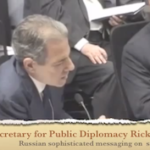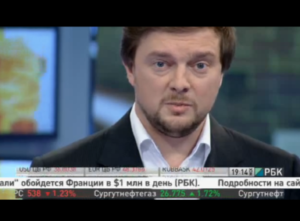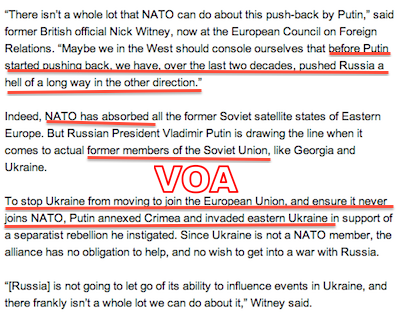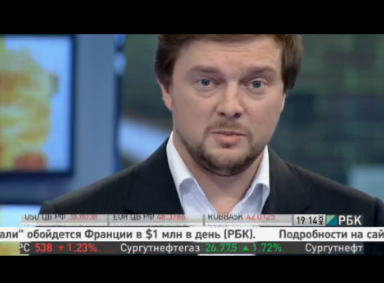BBG Watch Commentary
 U.S. Under Secretary of State for Public Diplomacy and Public Affairs Rick Stengel observed recently that social media is the area the U.S. should own in the information war with Russia, but “we really don’t own it.”
U.S. Under Secretary of State for Public Diplomacy and Public Affairs Rick Stengel observed recently that social media is the area the U.S. should own in the information war with Russia, but “we really don’t own it.”
Stengel was commenting how well Russia’s RT (formerly Russia Today) Kremlin media outlet is spreading propaganda and disinformation through its website and social media.
Although Under Secretary Stengel did not say this, former Secretary of State Hillary Clinton and many other experts are convinced that U.S. taxpayer-funded Voice of America (VOA) is not helping the U.S. win the information war with Russia.
If anything, VOA news reporting, especially VOA central English news output, helps Russia win the information war against the U.S., journalists, international media specialists and Russia experts in the United States told BBG Watch. The Voice of America Director David Ensor and the Public Relations Department, however, present the shows as some kind of journalistic victory for VOA and the United States. A VOA press release quotes some of the VOA guests’ better comments, but without attempting to analyze the overall impact of the program.
VOA PRESS RELEASE: “To be sure, the Russian anchors and guests on Cold War? have often been dismissive of Western views. The show is on Russian television, broadcasting to a public where President Putin is said to enjoy high approval ratings in the wake of the Russian invasion of Crimea and military activities in eastern Ukraine, but pro-Kremlin views are heard all the time on the air since the government began its media crackdown. They are not new. What is new is for Russians to hear something from the other side.”
Experts consulted by BBG Watch concluded that the overall impact of the program in Russia may very well reinforce anti-American and anti-Western views because the project has been extremely well-managed by the Russian side and the VOA team is too weak to win any arguments.
Experts, including former executives in charge of VOA programs, also point out that without an unspoken agreement by VOA to practice restraint and self-censorship, which violates the VOA Charter, the Kremlin would not allow the program to air in Russia and the Russian TV channel would never take the risk of doing such a project without the blessing of Putin’s propaganda experts. The Russian side has concluded that this program serves Russia’s interests while their country is involved in a major information war effort against the West and its own population, and in real war effort in Ukraine, one high level former VOA executive observed. “The Russians are not stupid. Anything else would be considered treasonous by the Kremlin, the Russian military and the FSB security service. This program airs in Russia because it strengthens President Putin by making the U.S. side look weak and without good arguments,” the expert added.
Contrary to claims by VOA public relations, both shows were public relations and public diplomacy disasters for VOA in Russia because Voice of America’s performance was very weak and VOA easily lost big time both times, other experts agreed.
ALSO READ: Voice of America helped Russia score propaganda points with poor VOA performance in a TV project, BBG Watch, September 2, 2014.

BBG Watch commentary title, “Information war – Russia 2 : Voice of America 0,” refers to two discussion programs the VOA Russian Service conducted recently with a television channel in Russia, Russian Business Channel – RBC TV, with strong encouragement from VOA Director David Ensor and VOA Executive Editor Steve Redisch, and clearly also with the blessing from the Kremlin.
While Ensor and Redisch apparently saw an opportunity to expand VOA’s limited reach in Russia, after the Kremlin earlier had banned direct VOA radio and TV broadcasts, President Putin’s information warfare advisors undoubtedly saw an opportunity to score propaganda points against the U.S. with a weak American partner while also showing that the Russian government is not afraid of foreign media.
The consensus is that the Voice of America lost big time both times with the two TV programs in Russia so far, however, the overall score for VOA in the information war with the Kremlin is still much worse.
U.S. experts have observed that poorly-managed Voice of America — especially VOA English News Service — often repeats Moscow’s disinformation and propaganda claims without any effective challenge or balance, thus helping the Kremlin and harming journalistic objectivity and U.S. interests in the process.
While the Russian Business Channel doing this program is considered to be more liberal than most other major media outlets in Russia, it obviously had to have permission from the Kremlin to do the show with VOA. President Putin’s media advisors saw a perfect opportunity to use weak and mismanaged Voice of America to score propaganda points in Russia against the U.S. by agreeing to do a program which they can manage and control with a U.S. organization that can’t seem to get its act together and no longer has staff that can take on the best Russian journalists who are defending the Kremlin’s point of view.
During the two shows with the Voice of America, the Russian television MC Andrey Reut not only had far more presence and authority than the VOA host and VOA guests; the VOA management has also apparently agreed to give the Russian side nearly total control of the program. VOA seems to have agreed to let the Russian side call all the important shots, such as deciding who would be allowed to speak and for how long, showing Russian videos and graphics while VOA did not, and allowing the Russian host to cut off VOA guests if they tried to make a good point.
If you can’t see part one of the second RBC TV-VOA show (in Russian), you may try these links:
The difference between the VOA crew and the Russian crew is especially striking. Standing behind a podium in a modern TV studio in Moscow, the Russian host Andrey Reut looked energetic, confident and, again, in control. He chose and introduced every topic and each time put VOA on the defensive. He was even better in the second show than in the first one.
Voice of America director David Ensor said that this was a co-production, but it was not a co-production at all. It was also not a debate, as a VOA press release implied. During the second show as in the first one, the VOA side again did not ask any questions while the Russian host repeatedly posed questions designed to cast doubt on any U.S. claim about Russia’s aggression in Ukraine. He did it decisively and effectively. He was impressive.
Among about a dozen Russia experts in the United States — some journalists, some academics, some Russian Americans and all of them Russian speakers — who watched the first program, all said that the Voice of America lost big and actually helped Russia score a propaganda victory with this program.
Those who watched the second program said the same thing. They noted that while the VOA host was slightly better the second time, the Russian MC, who was vastly better the first time but appeared somewhat nervous in the beginning, improved his performance even more in the second show.
On top of the one-sided program-control arrangement, both times the VOA host and guests were absolutely no match for the Russian channel MC and the Russian channel correspondent in New York who also participated in the program. “The role of the VOA host was both times minimal, he spoke very little and did not even come close to the Russian MC in the ability to present and defend an argument,” a former U.S. international broadcasting Russian Service journalist and international media expert observed.
If you can’t see part two of the second RBC TV-VOA show (in Russian), you may try these links:
Guest experts invited by VOA for the two shows did just as poorly. One seemed knowledgeable but far too weak to tangle with the Russian MC. The other, who was more forceful and also knowledgeable, unfortunately did not have sufficient Russian language skills to make a strong impression.
Admittedly, both VOA experts made a few good points, but when it looked that any of VOA’s guests might say something to effectively contradict the Kremlin line, the Russian host would quickly cut them off. The overall impression was that the U.S. side lacked strong arguments because in each case they were not effectively presented, in each case for different reasons. The U.S. side was successfully put on the defensive by the Russian MC, totally outperformed both times and simply did not have anyone to offer a strong and effective counter argument.
“This was not a debate program at all. The Russian side made their arguments and made Voice of America look like a side that can’t defend its position,” a former media manager, journalist and Russia expert told BBG Watch after watching both shows. The expert noted that at one point the Russian MC even mocked the VOA host in Washington, calling him an unflattering name.
“The VOA host was slightly better this time, but again he was not in control and it looked, as if his only function on the program was to make a quick comment and pass the question to his guest. Again, he didn’t ask any questions and didn’t contribute much to the program. VOA needs a better host and VOA needs to find better guests,” the expert concluded.
BBG Watch doubts the Voice of America under its current management is capable of achieving any substantial improvement and even if it did, the Russian channel could not continue to present the show in Russia. The only reason the Russian side agreed to this arrangement is because it makes the Voice of America look amateurish and the United States look bad while allowing the Russian channel to score propaganda points for Russia among Russian television audiences.
The Broadcasting Board of Governors (BBG) should measure the impact of the first two shows in Russia by doing a focus group and making sure any focus group is not compromised by Russia’s special security services. That may not be easy to do in Russia. For a quicker and more objective evaluation, the BBG should consult U.S. experts and consider doing a focus group among Russian visitors to the U.S.
If you can’t see the first RBC TV-VOA show, which aired on August 28, 2014, you may try these links:
But if all U.S. experts and Russian Americans consulted so far by BBG Watch think that the show helps the Kremlin and harms the U.S., there is little reason to think that it does anything else in Russia. The show is probably is even more effective there in reinforcing negative opinions and stereotypes about the United States. We noted that even many U.S. experts watching the Russian MC Andrey Reut were impressed, that’s how good he was in marginalizing the VOA participants and presenting the Kremlin line in a highly effective and sophisticated manner.
If the show actually harmed Russia’s image and Russia’s war effort, the Kremlin would never allow it to be shown in Russia. President Putin’s media and propaganda advisors are not naive, but VOA senior executives, who think that they can outsmart the Russian side, are. This VOA management team certainly can’t outsmart the Kremlin unless the BBG is happy with getting a larger audience share in Russia through this arrangement but does not much care whether it actually helps or harms U.S. interests and America’s image.
A former VOA Russian Service manager agreed that the show was terrible for VOA and the United States and excellent for Russia.
FORMER VOA MANAGER: “The VOA side didn’t have the necessary heft to outclass the Russians. If fact, they were seriously outmatched. The VOA guest couldn’t cope with the Russian MC in Moscow, he simply took over. If you’re going to do a project like this, you have to have someone with more gravitas who can hold his/her own, and that didn’t happen.
Americans lost big time. Don’t get in the arena if you can’t fight!”

Not all VOA Russian programs are this bad. There are a few VOA Russian staffers who put excellent news reports and interviews online challenging the Kremlin’s disinformation and propaganda. The Russian Service recently posted online a video interview with Dr. Paul Goble, who is a preeminent U.S. expert on Russia and Putin’s propaganda.
There is, however, far more unchallenged Russian disinformation in VOA English news reports, which are then translated by VOA foreign language services, sometimes even by the Russian Service, but not by the Ukrainian Service, which is one of the best ones in VOA.
In a recent article, Dr. Goble observed:
PAUL GOBLE: “First of all, many Western journalists confuse balance with objectivity. That means if anyone is in a position to put out a version of the story, however outrageous, journalists will often report it as one of the points of view out there, especially if the situation is confused or uncertain. And they may do so in ways that work particularly to Moscow’s advantage.”
This observation is especially true for many Voice of America news reports. VOA English News Service has hardly any Russia experts left and puts out unchallenged Kremlin claims almost on a daily basis in violation of the VOA Charter, which calls for accuracy and objectivity of VOA news. A recent VOA news analysis included an unchallenged claim that the NATO expansion in Eastern Europe was to blame for President Putin’s annexation of Crimea and invasion of eastern Ukraine.
A prominent expert in the U.S. on Russian politics, media and propaganda, whose work has been noted in The New York Times, who reviewed the VOA Russian Service television program and some of VOA’s English news reports about Russia, told BBG Watch that trying to reform the Voice of America in its current state could be futile.
RUSSIA EXPERT IN THE U.S.: “I recently had occasion to read some awful VOA articles. I was going to try to put a comment on the website, but then I realized this is futile. VOA is futile. You should just create another radio station around it. Or TV station.
The reforms have to be substantial and at the top and center, and then these manifestations of problems will become less. Tackling each and every one of them isn’t going to fix it.”
RUSSIA EXPERT IN THE U.S.: “The rebel leaders claim they are merely ‘helped’ by Russian soldiers but in fact Russian convoys of tanks and troops have battled on their own, far greater in number than local separatists, in locations from Lugansk to Mariupol, all of which has been covered by Western media — and backed up by NATO intelligence and U.S. satellite publications,” the expert observed.
RUSSIA EXPERT IN THE U.S.: “In August, as Ukrainian armed forces made gains and began to seize tanks on the battlefield and take POWs, it became obvious that Russian companies such as the 76th Pskov Assault Guards of the Airborne Troops Division were in combat on Ukrainian territory. As dead bodies continued to come back in ‘Cargo 200′ trucks — as the military term has it — the public has gradually become alarmed of the reality of warfare with their ancient neighbour. The Russian Soldiers’ Mothers groups, opposition leaders, the lone parliamentarian who voted against the Crimea annexation, human rights advocates, and one brave legislator from Pskov have all attempted to bring to light Russia’s warfare in Ukraine, and have suffered harassment for their efforts” The U.S. expert added: “I realize nothing remotely like that could go on VOA.”
Most of the time, VOA English news reporting will be much more simplistic as in this quote from a VOA English news report:
VOA NEWS: “Both Ukraine and NATO accuse Moscow of providing direct help to separatists.
For its part, Russia has consistently denied the presence of Russian troops in Ukraine, while rebel leaders say they have been helped by Russian soldiers who have used their vacation time to battle Ukrainian troops on Ukrainian soil.”
In this particular news report, VOA did not attempt to show any evidence that counters such Russian claims, while in other reports it would also only show the Russian separatists’ side of the story without balancing their accusations against the Ukrainian government in Kyiv.
Much of the debunking of the Kremlin’s propaganda and disinformation is now left to better managed Radio Free Europe / Radio Liberty (RFE/RL), which also reports to the Broadcasting Board of Governors. RFE/RL has a number of excellent Russia experts and journalists. They are not fooled by Russia’s disinformation and propaganda campaigns and challenge them effectively.
RFE/RL, however, does not specialize in reporting U.S. news and U.S. responses to Russia’s aggression in Ukraine nor can RFE/RL effectively present U.S. viewpoints, as this job has been left by the Congress and the BBG to badly managed VOA. Unfortunately, most Russia experts in the U.S. seem to agree with former Secretary of State Hillary Clinton that the U.S. is losing the information war. Experts consulted by BBG Watch have concluded that with some exceptions, Voice of America programs, including the latest TV program with the Russian Business Channel, actually help to spread and promote the Kremlin’s anti-American disinformation and propaganda.
###
VOA PRESS RELEASE
Something New for Russians
September 05, 2014
For the past two weeks, TV audiences in Russia have had a chance to see something exceedingly unusual on Russian airwaves: candid exchanges about U.S. and Russian policies, including criticism of the Putin government. The exchanges took place on a new program called Cold War?, a joint project of the Russian Business Channel (RBC) and Voice of America’s Russian Service, that premiered on RBC at the end of August. The program, which is broadcast throughout Russia by RBC in prime time on Thursday nights, links VOA hosts and guests in Washington and New York with RBC’s Moscow-based anchor and reporters.
The result is a discussion in which Russians hear views and opinions available on no other TV program in Russia. While RBC’s anchor controls the show, and often seeks to dominate the debate, Russian viewers are hearing something new—both sides of the argument.
Some samples from the first broadcast, on August 28: (VOA’s studio guest for this program was Erica Marat, a Research Fellow at the Central Asia-Caucasus Institute at John Hopkins University):
–Marat to RBC anchor Andrey Reut: “You … repeat word for word what Kremlin officials keep saying. You look at the video of Russian troops on the territory of Ukraine, the Russian equipment, new equipment, not Soviet, and new technology that went into the Ukraine. You look at it and say, ‘But there is no evidence! How can you prove it?’”
–Marat on the West’s view of Russia: “I think this is a turning point for Putin because finally, the West and the international community are calling a spade a spade: it is a full-scale war between two countries—Russian military are fighting with the military of Ukraine.”
–Marat on the future: “You have to understand that this situation is not forever. When (the Russian) economy starts to shrink … public trust in Putin will be reduced…. We all remember that a couple of decades ago, the economy was probably the most important factor in leading to a collapse of the USSR.”
Samples from the second show, broadcast on September 4: (VOA’s studio guest was Donald Jensen, of the Center for Transatlantic Relations at Johns Hopkins University. Before joining Johns Hopkins, Jensen was Director of Research and Analysis at Radio Free Europe/Radio Liberty).
–Jensen on the strong and growing Russian presence in Ukraine: “The Russian invasion, especially in recent days, is in fact an escalation.”
–Jensen on supporting statements: “As we learned from the head of [the Russian non-governmental] organization Soldier’s Mothers there are seven to eight thousand Russian troops fighting in Ukraine.”
To be sure, the Russian anchors and guests on Cold War? have often been dismissive of Western views. The show is on Russian television, broadcasting to a public where President Putin is said to enjoy high approval ratings in the wake of the Russian invasion of Crimea and military activities in eastern Ukraine, but pro-Kremlin views are heard all the time on the air since the government began its media crackdown. They are not new. What is new is for Russians to hear something from the other side.
RBC estimates it has an audience share of 11 percent within the Russian Federation, with particular strength in the influential Russian business community. According to Elez Biberaj, head of VOA’s Eurasia Division, “the program gives VOA a rare new opportunity to present U.S. policies and views to millions of Russians. Accepting such a challenge is part of our mission at VOA.”
###
VOA PRESS RELEASE
VOA Russian and Russian Affiliate Launch New Show about US-Russian Relations
August 28, 2014
A groundbreaking TV show co-produced by Voice of America’s Russian Service and the Russian Business Channel premiered live Thursday in a primetime slot to audiences in Russia.
Cold War? connects VOA hosts in Washington and New York with RBC’s Moscow-based host for a candid discussion with in-studio guests about points of contention between the two countries.
The first episode aired Thursday at 7:35 p.m. Moscow time, directly after RBC’s evening news program, and featured guests Maria Snegovoaya, a columnist at Vedomosti, a major Russian language business daily, and Erica Marat, a professor at the National Defense University.
The discussion was very blunt, as discussions often were in the days of the Cold War. In one exchange, the RBC host in Moscow, Andrey Reut, said that Western sanctions were ineffective and did nothing but increase President Putin’s popularity. Marat responded that Putin’s ratings aren’t growing because of the sanctions, but because of propaganda in Russia’s government-controlled media and the government’s suppression of the opposition media.
VOA Director David Ensor says Cold War? “comes at an absolutely critical time in U.S.-Russia relations and builds on a very successful partnership between VOA and RBC.” Ensor added that it also marks the first-ever co-production between VOA and a major TV network within Russia.
VOA Russia Service broadcasters Alexey Berezin (in Washington) and Michael Gutkin (in New York) co-host the weekly show along with RBC New York co-host Boris Koltsov and RBC Editor-in-Chief Andrey Reut in Moscow.
For two years, VOA Russian has been providing popular daily 5- to 10-minutes interactives from the New York Stock Exchange that air live on RBC’s evening business news show. Cold War? is the first full-length VOA program, however, to air on Russian TV since 2007, when the Russian government clamped down on its already restrictive media environment. Voice of America’s Russian Service has since employed a successful digital strategy to inform and engage a Russian audience that is one of the most active social media communities in the world.
The RBC has an audience share of 11 percent within the Russian Federation.
For more information about this release, contact the VOA Public Relations office in Washington at (202) 203-4959, or write topublicrelations@voanews.com. For more information about VOA, visit the Public Relations website at www.insidevoa.com, or the main news site atwww.voanews.com.

Comments are closed.